The studio behind Oscar-winning movies like “Green Book,” “Spotlight” and “An Inconvenient Truth” has gone the way of the fax machine and pager.
Netflix is also getting out of the auteur business.
Harper’s Magazine declared it’s not a matter of if, but when Hollywood ceases to exist, at least in its current form.
Yes, Tinsel Town is in panic mode, and understandably so. And that doesn’t include the fallout from last year’s dueling strikes, the rise of AI and audiences rejecting some of the industry’s once-bulletproof franchises (“Indiana Jones,” “The Matrix,” “The Marvels”)
Let’s start with Participant, formed in 2004 by progressive eBay co-founder Jeff Skoll to create socially aware films. That mandate seemed like a recipe for failure, but the studio walked the line between message and merriment.
It earned plenty of critical love, too, but when a scare documentary on climate change grosses a gaudy $24 million stateside you’re doing something right.
Until now, apparently.

Frazer Harrison/Getty Images for Paramount Pictures
Previous Participant projects like “Truth,” “RGB,” and “When They See Us” certainly had a liberal-leaning approach, and some genuinely impacted the culture. That Skoll opted to shutter the company now says something.
Progressive stories will still be made, of course, but they lost a powerful ally in Participant.
Prestige filmmakers have struggled to get their visions made in the 21st century. Even a highly regarded filmmaker like John Sayles (“Matewan,” “Eight Men Out”) can no longer be guaranteed studio space for future projects.
That allowed Netflix to gain a toehold in the cinematic space. The streaming giant gifted gargantuan budgets to filmmakers like Martin Scorsese (“The Irishman”) to make their movies, their way while Hollywood studios flinched.
The studio previously produced movies with the Coen brothers, Scorsese, Jane Campion, and more.
Not anymore.

ROBYN BECK/AFP via Getty Images
Netflix announced it will focus more on populist original films and skip the auteur-driven projects of yore. Moving forward, the platform will focus on films that gain more eyeballs, like the “Knives Out” franchise.
That means celebrated filmmakers like David Lynch and Katherine Bigelow can’t crack the Netflix code.
Apple paid handsomely to fund Ridley Scott’s “Napoleon” epic. Will they follow suit? “Napoleon” earned just $217 million worldwide compared to its reported $200 million budget. (Studios split revenue with movie theaters and must fork over additional costs for marketing, etc.)
The aforementioned Harper’s Magazine piece is littered with doom and gloom, along with the receipts to back it up:
The industry as a whole is now facing a broad contraction. Between August 2022 and the end of last year, employment fell by 26 percent—more than one job gone in every four. Layoffs hit Warner Bros. Discovery, Netflix, Paramount Global, Roku, and others in 2022. In 2023, firings swept through the representation giants United Talent Agency and Creative Artists Agency; Netflix, Paramount Global, and Roku again; plus Hulu, NBCUniversal, and Lionsgate. In early 2024, it was announced that Amazon was cutting hundreds of jobs from its Prime Video and Amazon MGM Studios divisions. In February, Paramount Global laid off roughly eight hundred people. It’s unclear which streamers will survive.
Hollywood is still deathly afraid of how AI technology will impact its workforce. We’ve already seen stars lose out on voiceover work thanks to AI.
That could be the tip of a digital iceberg the likes of which Hollywood has never seen before.
Panic. And it’s understandable.
That explains reviving stone-cold dead franchises like “The Blair Witch Project” and the “Scary Movie” series. We’ll also see another live-action “Popeye” film as well as a movie based on the board game “Monopoly.”
Can Hollywood be saved? Perhaps, but it won’t be by any of the above film projects.
It begins with innovation, acknowledging audience expectations, and producing less ideological content.
The assembled stars should be less dismissive of their dwindling fan bases, too. Liberal actor Nick Offerman of “Parks and Recreation” fame set that tone by telling the press his new movie “Civil War” would lose audiences members if it chose a political side.
That’s smart. What’s less than smart?
Actor Alan Ritchson teeing off on President Donald Trump, the police, and Christians while “promoting” his latest project, “The Ministry of Ungentlemanly Warfare.”
It might take real risk-taking, which is anathema to an industry known for playing it safe. Consider what Kevin Costner has in store for us later this year as the ultimate risk.

Jerod Harris/Getty Images for CinemaCon
His “Horizon” film saga is an old-fashioned western, at least on paper, that could span as many as four feature films. The first two installments will be released on June 28 and August 16, respectively.
The film legend broke the old Hollywood saw about using your own money to invest in the series.
Will it pay off?
Costner summed up the all-American saga during his appearance at this month’s CinemaCon gathering:
When I think about the promise of America, there was a promise out here, if you could go. If you were tough enough, if you were mean enough, if you were resourceful enough, if you were lucky enough, you could take what you wanted in America.
The same could be true of Hollywood moving forward. Or else.
* * *
Christian Toto is an award-winning journalist, movie critic and editor of HollywoodInToto.com. He previously served as associate editor with Breitbart News’ Big Hollywood. Follow him at @HollywoodInToto.
The views expressed in this piece are those of the author and do not necessarily represent those of The Daily Wire.

Continue reading this exclusive article and join the conversation, plus watch free videos on DW+
Already a member?

.png)
.png)

